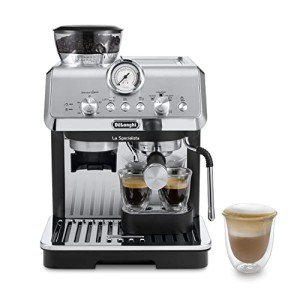The Rise of Home Espresso Machines: A Comprehensive Guide
As coffee fans continue to seek fresh and flavorful brews in your home, the appeal of home espresso machines has actually surged recently. No longer simply the domain of coffee shops and coffeehouse, these machines empower individuals to craft barista-quality espresso beverages from the convenience of their kitchens. This short article will check out the different kinds of home espresso machines, their features, and considerations for choosing the right one. Additionally, it will supply a selection of FAQs to assist potential buyers make informed choices.
Types of Home Espresso Machines
Home espresso machines can be classified into numerous classifications based upon their systems and user-friendliness. Online Espresso Machines Store has its special features, pros, and cons.
| Type | Description | Pros | Cons |
|---|---|---|---|
| Manual Espresso Machines | Requires the user to manually manage the brewing process, involving strategies like pulling a lever to create pressure. | - Complete control over brewing process - Compact style | - Requires skill and practice - Time-consuming |
| Semi-Automatic Machines | Machine automates water flow and pressure, however the user still manages the dosing and duration of the developing procedure. | - Balance of automation and control - Versatile | - Learning curve for refining strategies |
| Fully Automatic Machines | Automates the whole brewing procedure, from grinding to brewing, typically with programmable settings for personalized drinks. | - Extremely user-friendly - Quick and hassle-free | - Less control over the developing process - Higher rate point |
| Capsule or Pod Machines | Uses pre-packaged espresso capsules or pods to develop coffee quickly and quickly. | - Extremely simple to use - Minimal clean-up | - Limited taste range - More pricey per cup than ground coffee |
| Super-Automatic Machines | Combines features of completely automatic machines with built-in mills, enabling users to brew entire bean espresso and milk-based drinks with one touch. | - All-in-one benefit - Ideal for milk-based drinks | - Often the most expensive - Can be bulky |
Features to Consider
When selecting a home espresso machine, potential buyers should consider the following features to guarantee they choose a machine that satisfies their needs:
Grinder Type:
- Built-in grinders can supply fresher premises but may need more upkeep.
- Different grinders permit more personalization of grind size.
Pressure:
- Look for machines that produce a minimum of 9 bars of pressure, which is optimum for brewing espresso.
Water Temperature Control:
- Machines with adjustable temperature settings allow for better extraction of flavor from beans.
Milk Frothing Options:
- Consider whether you desire a manual steam wand for frothing or an automatic milk frother for benefit.
Ease of Cleaning:
- Machines with detachable parts and self-cleaning functions substantially reduce cleanup time.
Size and Design:
- Ensure the machine fits easily in your cooking area and aligns with your aesthetic preferences.
Budget:
- Set a budget before starting your search, as costs can range substantially from affordable models to high-end machines.
Benefits of Home Espresso Machines
Owning a home espresso machine provides many advantages:
- Cost-Effective: Over time, brewing espresso at home can conserve coffee lovers cash compared to regular café visits.
- Customization: Users can try out various beans, grind sizes, and brewing strategies to discover their ideal cup.
- Convenience: The capability to brew espresso any time gets rid of the need to head out to a coffee shop, especially advantageous during late nights or early mornings.
- Quality assurance: With a home machine, people have complete control over the quality of ingredients and brewing processes.
Drawbacks of Home Espresso Machines
However, there are some drawbacks to think about:
- Initial Investment: High-quality espresso machines can be pricey, needing a significant in advance investment.
- Knowing Curve: Mastering the art of espresso developing can take time and practice, which might be daunting for novices.
- Upkeep: Like any device, espresso machines require routine cleaning and maintenance to make sure ideal performance.
FAQs
1. What is the very best type of home espresso machine for beginners?
Response: For novices, a semi-automatic machine is frequently suggested as it offers a balance between control and automation, allowing you to find out the fundamentals without frustrating intricacy.
2. Just how read the full info here should I invest on a home espresso machine?
Answer: Entry-level machines can begin around ₤ 100 to ₤ 300, while higher-end designs can vary from ₤ 500 to over ₤ 2000. It's vital to set a budget based upon your expected use and desired functions.
3. Do I require a different grinder?
Answer: While some espresso machines feature built-in mills, investing in a separate grinder permits greater personalization and ensures better quality grounds.
4. How often should I clean my espresso machine?
Answer: Cleaning frequency can differ by machine type, but it's usually recommended to clean up the machine after each use and perform deep cleanings weekly or month-to-month, depending on usage.
5. Can I make milk-based beverages with any espresso machine?
Answer: Not all machines include milk frothing abilities. If you enjoy drinks like lattes or coffees, search for a machine with a steam wand or automatic frother.
Home espresso machines are transforming the way coffee fanatics enjoy their beloved brews. With various types and advanced features readily available in the market, there is something for everybody. Whether it's the joy of developing unique dishes or just relishing the best shot of espresso, purchasing a home espresso machine can enhance both the coffee-drinking experience and the lifestyle for coffee enthusiasts all over. Similar to any financial investment, it is vital to weigh the advantages against the possible drawbacks and select a machine that perfectly fits both your lifestyle and preferences.

